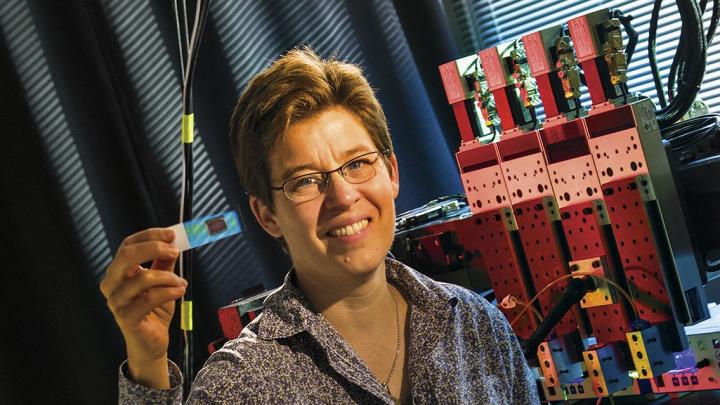Jennifer Lewis’s engineered materials look to nature as a guide. The new Wyss professor of biologically inspired engineering uses 3-D printing to build minuscule devices, from microbatteries to synthetic spider webs of threads a micron thick. Now she works to “print” biology, motivated by “a bit of naiveté mixed with a strong desire to benefit society.” Her lab develops “inks” with functional properties: cell-laden ones to print 3-D tissues, or conductive inks that flow through rollerball pens at room temperature to draw functional circuits on paper. Lewis works with high-school teachers to incorporate these inexpensive pen-on-paper electronics in their classes, so students can explore engineering through circuit design. Her educational interest draws on personal experience: despite coming from a family of engineers—her father worked for General Electric, and her sister is a chemical engineer—Lewis first encountered materials science in college at the University of Illinois. She later joined the faculty and taught there for 20 years (after earning her S.D. at MIT), returning to Cambridge for her new appointment in January. The move back East has given Lewis, an avid basketball player, a chance to pick up her squash racket again, as well. She’s also been exploring Boston through another longtime hobby: one of this fiction fan’s recent favorites is The Dante Club, a whodunit set in Civil War Cambridge, which helped immerse Lewis in her new community. She and her partner, Lori Sanders, who also studies biomaterials, live near the undergraduate Houses, “right in the heart of things,” and Lewis enjoys the intellectual stimulation of her new home: “It’s time to stretch and grow in new directions.”
Harvard Portrait: Jennifer Lewis

You might also like
Breaking Bread
Alexander Heffner ’12 plumbs the state of democracy.
Reading the Winds
Thai sailor Sophia Montgomery competes in the Olympics.
Chinese Trade Dragons
How Will China’s Rapid Growth in the Clean Technology Industry Reshape U.S.-China Policy?
Most popular
More to explore
Harvard Philosophy Professor Alison Simmons on "Being a Minded Thing"
A philosopher on perception, the canon, and being “a minded thing”







